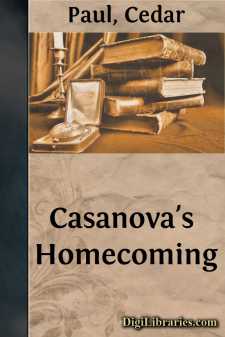Categories
- Antiques & Collectibles 13
- Architecture 36
- Art 48
- Bibles 22
- Biography & Autobiography 813
- Body, Mind & Spirit 142
- Business & Economics 28
- Children's Books 14
- Children's Fiction 11
- Computers 4
- Cooking 94
- Crafts & Hobbies 4
- Drama 346
- Education 46
- Family & Relationships 57
- Fiction 11828
- Games 19
- Gardening 17
- Health & Fitness 34
- History 1377
- House & Home 1
- Humor 147
- Juvenile Fiction 1873
- Juvenile Nonfiction 202
- Language Arts & Disciplines 88
- Law 16
- Literary Collections 686
- Literary Criticism 179
- Mathematics 13
- Medical 41
- Music 40
- Nature 179
- Non-Classifiable 1768
- Performing Arts 7
- Periodicals 1453
- Philosophy 64
- Photography 2
- Poetry 896
- Political Science 203
- Psychology 42
- Reference 154
- Religion 513
- Science 126
- Self-Help 84
- Social Science 81
- Sports & Recreation 34
- Study Aids 3
- Technology & Engineering 59
- Transportation 23
- Travel 463
- True Crime 29
Casanova's Homecoming
by: Cedar Paul
Categories:
Description:
Excerpt
CHAPTER ONE.
Casanova was in his fifty-third year. Though no longer driven by the lust of adventure that had spurred him in his youth, he was still hunted athwart the world, hunted now by a restlessness due to the approach of old age. His yearning for Venice, the city of his birth, grew so intense that, like a wounded bird slowly circling downwards in its death flight, he began to move in ever-narrowing circles. Again and again, during the last ten years of his exile, he had implored the Supreme Council for leave to return home. Erstwhile, in the drafting of these petitions—a work in which he was a past master—a defiant, wilful spirit seemed to have guided his pen; at times even he appeared to take a grim delight in his forwardness. But of late his requests had been couched in humble, beseeching words which displayed, ever more plainly, the ache of homesickness and genuine repentance.
The sins of his earlier years (the most unpardonable to the Venetian councillors was his free-thinking, not his dissoluteness, or quarrelsomeness, or rather sportive knavery) were by degrees passing into oblivion, and so Casanova had a certain amount of confidence that he would receive a hearing. The history of his marvellous escape from The Leads of Venice, which he had recounted on innumerable occasions at the courts of princes, in the palaces of nobles, at the supper tables of burghers, and in houses of ill fame, was beginning to make people forget any disrepute which had attached to his name. Moreover, in letters to Mantua, where he had been staying for two months, persons of influence had conveyed hope to the adventurer, whose inward and outward lustre were gradually beginning to fade, that ere long there would come a favorable turn in his fortunes.
Since his means were now extremely slender, Casanova had decided to await the expected pardon in the modest but respectable inn where he had stayed in happier years. To make only passing mention of less spiritual amusements, with which he could not wholly dispense—he spent most of his time in writing a polemic against the slanderer Voltaire, hoping that the publication of this document would serve, upon his return to Venice, to give him unchallenged position and prestige in the eyes of all well-disposed citizens.
One morning he went out for a walk beyond the town limits to excogitate the final touches for some sentences that were to annihilate the infidel Frenchman. Suddenly he fell prey to a disquiet that almost amounted to physical distress. He turned over in his mind the life he had been leading for the last three months. It had grown wearisomely familiar—the morning walks into the country, the evenings spent in gambling for petty stakes with the reputed Baron Perotti and the latter's pock-marked mistress. He thought of the affection lavished upon himself by his hostess, a woman ardent but no longer young. He thought of how he had passed his time over the writings of Voltaire and over the composition of an audacious rejoinder which until that moment had seemed to him by no means inadequate....



